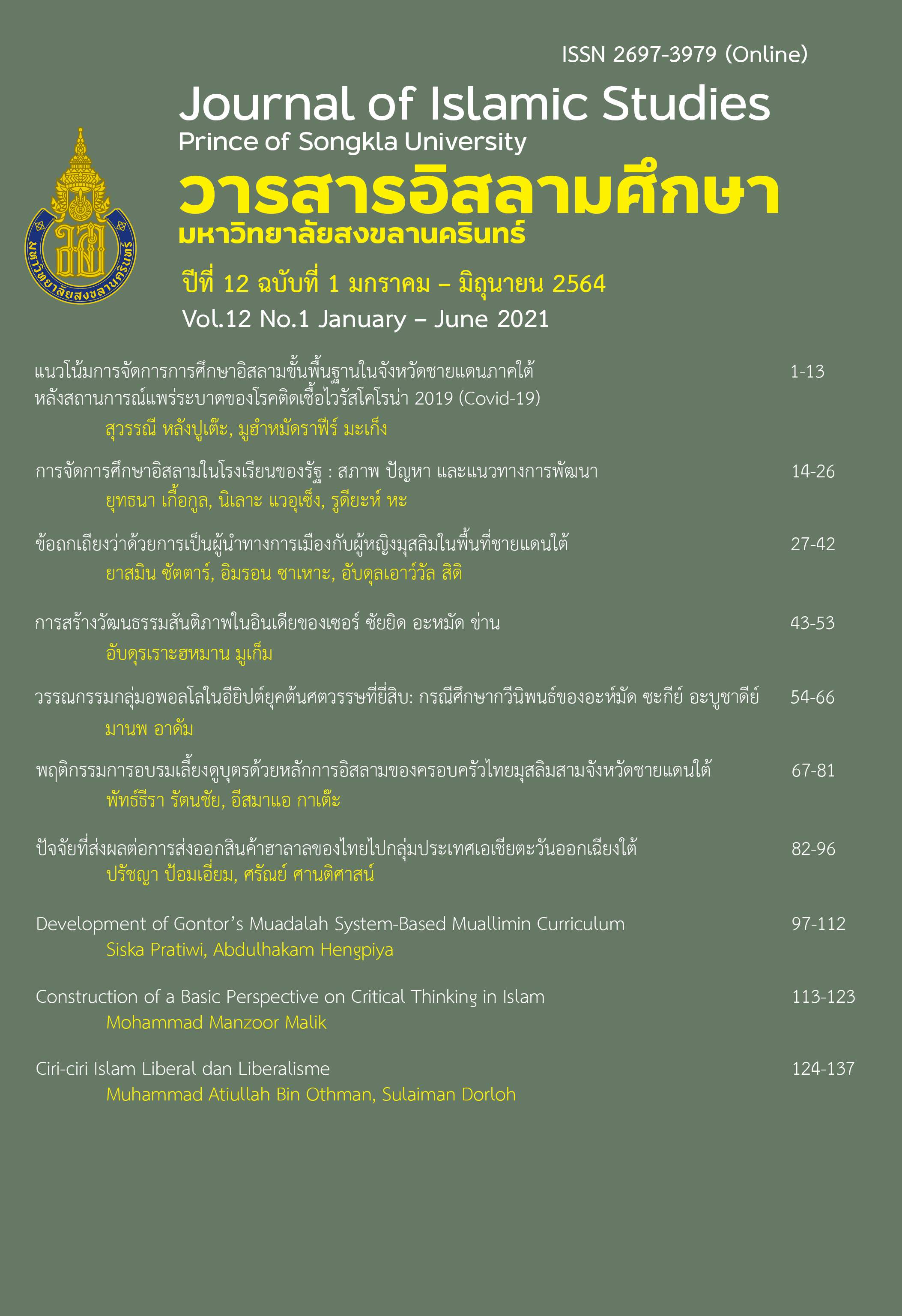Islamic Studies Provision in Government Schools: States, Problems, and Development Guidelines
Keywords:
Islamic Studies Provision, States, Problems, Development GuidelinesAbstract
Objective This research aimed to examine the present states and problems, and to delineate developmental guidelines for Islamic studies provision in public schools in three southern border provinces of Thailand.
Methodology A qualitative approach to collecting the data through interview and focus group used for the present study. 25 key informants were purposively selected based on required criteria. They consisted 9 administrators, 9 Islamic studies teachers, and 6 parents.
Research findings it reveals the national education policy is in line with community’s identity. Learners can learn both religious and academic subjects and abide by Islamic doctrine. Schools encounter many problems i.e., being located in unconducive environment, inadequate Islamic teaching materials, teacher’s limitation in utilizing technology, ineffective lesson plan preparation, relying on traditional approaches, and lack of certain desired student attributes. The proposed guidelines are that specific policy should be formulated and the program should be supported through activities related to economy and politics of the community; Islamic studies teaching and learning innovation should be developed; short and long term budget should be allocated accordingly to the current condition; student-centered approach and co-curriculum should be emphasized to help mold learners’ personalities according to Islamic teaching. In addition, there should be a department responsible for accrediting the study results of those who finish from the government schools in order for them to further their study either within the country or oversea.
Contributions The organizations and personnel involved in administering Islamic studies in public schools need to understand the basic concepts and philosophies in managing Islamic studies. The government should also formulate standardized policy and applicable educational quality assurance system for the schools to apply.
References
Alikahae, A., & Wae-useng, N. (2010). Problems and needs of Islamic Studies Teachers in Learning and Teaching Islamic Studies in Public Schools Under the Development Project of Islamic Studies Learning and Teaching in Primary and Secondary Schools in Pattani Province. (Research Report) College of Islamic Studies, Prince of Songkla University.
Chantavanich, S. (2014). Qualitative Research Methods. (10th ed.). Chulalongkorn University Press.
Ministry of Education. (2005). Education development plan in southern border provinces. Office of The Education Council.
Molo, M. (2011). Administration of Intensive Islamic Study Curriculum of School Administrator in the Three Southern Border Provinces. (Research Report) Faculty of Education (Educational Administration), Prince of Songkla University.
Nuyamad, L. (2014). Problems of the Implementation of the Curriculum of Islamic Studies of 2008/2551 in the School of One District One Dream School in Satun Province. (Research Report) College of Islamic Studies, Prince of Songkla University.
Office of the Basic Education Commission Ministry of Education. (2010). laksūt ʻItsalām sưksā tām laksūt kǣn klāng kānsưksā naphư̄n thān Phutthasakkarāt sō̜ngphanhārō̜ihāsipʻet [Islamic Curriculum Under the core curriculum of basic education in B.E.2551]. (1st ed.) Thailand Agricultural Cooperative Limited Press.
Sama, M. N. (2010). State and Problems of Instructional Management of Islamic Studies in the Public School Implementing Dual Curricula in Yala Province. (Research Report) College of Islamic Studies, Prince of Songkla University.
Wae-useng, N., Salaeming, M., & Baka, M. (2008). Conditions, Problems, and Needs of Pondok Institutions on Managing Education in Southern Border Provinces (Research Report) College of Islamic Studies, Prince of Songkla University.
Wanichayakorn Th. & Suntharayut Th. (2012). Model of Islamic School Appropriations for Thai Society. Journal of Education Administration Burapha University, 6(2), 16 – 30.
Downloads
Published
How to Cite
Issue
Section
License
Copyright (c) 2021 Journal of Islamic Studies, Prince of Songkla University

This work is licensed under a Creative Commons Attribution 4.0 International License.
All articles Published in The Journal of Islamic Studies are author’s opinions, and not the responsibility of the Faculty of Islamic Sciences nor the editorial board. However any citation should be referred to the journal.
















